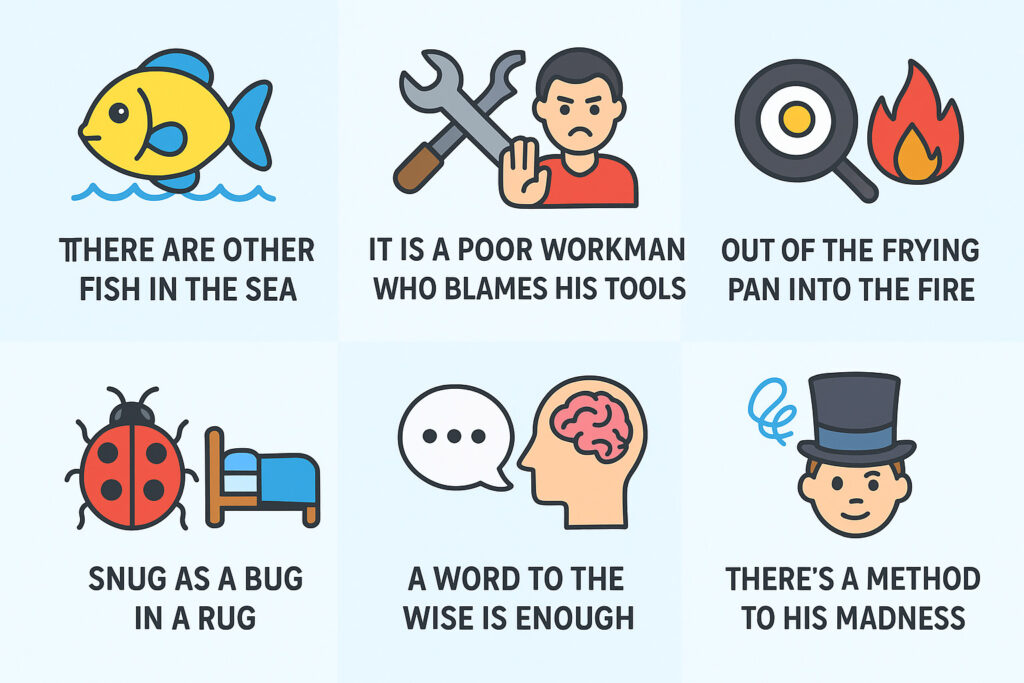

THERE ARE OTHER FISH IN THE SEA.
Haverá outras oportunidades.
THERE’S A METHOD TO HIS MADNESS.
Ele é mais esperto do que pensa.
IT IS A POOR WORKMAN WHO BLAMES HIS TOOLS.
Não culpe outra pessoa por seus erros.
OUT OF THE FRYING PAN TO THE FIRE.
De mal a pior.
SNUG AS A BUG IN A RUG.
Está super confortável.
A WORD TO THE WISE IS ENOUGH.
Para um bom entendedor, meia palavra basta.
Gustavo Decleve’s contribution
🐟 THERE ARE OTHER FISH IN THE SEA
Meaning:
It means there are plenty of other opportunities, people, or possibilities, especially after a disappointment.
Most commonly, it’s used to comfort someone after a breakup, rejection, or something that didn’t work out, reminding them that better options still exist.
✅ Examples
- After a breakup:
“I know you’re sad, but don’t worry — there are other fish in the sea.” - After not getting a job:
“You didn’t get the position? That’s tough, but there are other fish in the sea.” - After a friendship ends:
“If she doesn’t value you, there are other fish in the sea who will appreciate you.” - After missing an opportunity:
“You didn’t buy the house in time, but there are other fish in the sea.” - Encouragement:
“Don’t stress about this one chance. There are other fish in the sea.”
🧠 THERE IS A METHOD TO HIS MADNESS
✅ Meaning
This expression means that even if someone looks chaotic, strange, or illogical, they actually have a plan or a purpose behind what they are doing.
What seems like “madness” is actually organized or intentional.
It’s often used when someone’s behavior appears confusing at first, but then you realize it makes sense.
✅ Examples in sentences
- At work:
“I know John’s desk looks like a disaster, but there’s a method to his madness — he knows exactly where everything is.” - Creative process:
“Her painting style seems random, but there’s a method to her madness. Every color is planned.” - Teaching:
“The professor’s classes feel messy, but trust me — there’s a method to his madness. You’ll understand later.” - Cooking:
“He throws ingredients in without measuring, but the dish always turns out perfect. There’s a method to his madness.” - Strategy:
“His moves look unpredictable, but there’s a method to his madness — he’s thinking three steps ahead.”
🔨 IT IS A POOR WORKMAN WHO BLAMES HIS TOOLS
✅ Meaning
This expression means that a skilled person takes responsibility for their performance, instead of blaming external things (like tools, circumstances, or other people) when something goes wrong.
In other words:
If someone does a bad job and blames their equipment, the real problem is usually their own lack of skill, not the tools.
✅ Examples
- At work:
“He said the software is the reason he couldn’t finish the report, but honestly… it is a poor workman who blames his tools.” - In sports:
“He keeps saying he lost the game because his shoes are old. Well, it is a poor workman who blames his tools.” - At school:
“She said she failed the test because her pen wasn’t good. It is a poor workman who blames his tools.” - In cooking:
“He ruined the cake and blamed the oven, but it is a poor workman who blames his tools.” - In music:
“A good musician plays well even with a cheap guitar — it is a poor workman who blames his tools.”
🔥 OUT OF THE FRYING PAN INTO THE FIRE
(You may also hear: “Out of the frying pan and into the fire.”)
✅ Meaning
This expression means you escape a bad situation only to end up in an even worse one.
It describes going from trouble → bigger trouble.
Think of someone jumping out of a hot frying pan… directly into fire. The situation gets worse instead of better.
✅ Examples
- At work:
“I left my stressful job, but the new one is even worse. I went out of the frying pan into the fire.” - Relationships:
“She broke up with her boyfriend because he was messy, then started dating someone who never shows up. Out of the frying pan into the fire.” - Money issues:
“He took a loan to pay another loan. That’s going out of the frying pan into the fire.” - Moving:
“They moved to escape the noise, but now they live next to a construction site. Out of the frying pan into the fire.” - School:
“He switched classes to avoid a strict teacher… but the new one is even stricter. Out of the frying pan into the fire.”
🐞 Snug as a Bug in a Rug
Meaning
The expression “snug as a bug in a rug” means to be very comfortable, cozy, and warm.
- Snug: Means neat, compact, and comfortable.
- Bug: In this context, it refers to a small, harmless insect.
- Rug: Refers to a carpet or a piece of heavy fabric. The image is of a small insect tucked securely inside the folds or fibers of a rug, protected from the cold or danger.
It is often used to describe a person or a pet who is deeply nestled, usually under blankets or by a fire, and is completely at ease.
Origin
This phrase has been in use since the mid-18th century, likely originating in America. Its appeal comes from the rhyme (“bug” and “rug”) and the vivid image of a tiny creature being perfectly protected.
Example in a Sentence
“After playing outside in the cold all afternoon, she climbed into her warm bed with her favorite book and was snug as a bug in a rug.”
🎯 More Examples of Similes for “Comfort”
Here are some other common English similes (comparisons using “like” or “as”) that express a similar idea of comfort, security, or ease:
| Simile | Meaning/Context |
| As easy as pie | Very simple and requiring almost no effort. |
| Like a fish in water | Feeling completely natural, comfortable, and well-suited to a situation. |
| As right as rain | Feeling perfectly well, healthy, or recovered. |
| Like a duck to water | Taking to a new activity or environment very easily and naturally. |
| As safe as houses | Completely secure and with no danger. |
| Like a dream | Something that went perfectly and smoothly (e.g., The new car runs like a dream). |
🗣️ A WORD TO THE WISE IS ENOUGH
✅ Meaning
This expression means that smart people only need a small hint or advice — they understand quickly, without needing long explanations.
If someone is wise, one word is enough for them to get the message.
✅ Examples
- “Don’t tell him the whole story — just warn him about the deadline. A word to the wise is enough.”
- “Lock your doors at night… a word to the wise is enough.”
(Meaning: the person will understand the risk without more details.) - “The teacher said, ‘Keep an eye on question 5.’ A word to the wise is enough.”
- “If you want to avoid trouble, stay alert. A word to the wise is enough.”
- “I didn’t have to explain everything to her; she understood immediately. A word to the wise is enough.”

